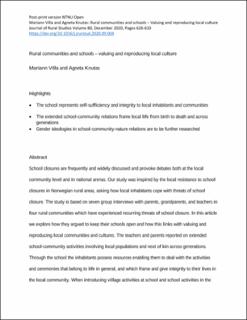| dc.contributor.author | Villa, Mariann | |
| dc.contributor.author | Knutas, Kerstin Agneta | |
| dc.date.accessioned | 2021-03-08T09:45:52Z | |
| dc.date.available | 2021-03-08T09:45:52Z | |
| dc.date.created | 2020-12-03T16:05:36Z | |
| dc.date.issued | 2020 | |
| dc.identifier.citation | Journal of Rural Studies. 2020, 80, 626-633. | en_US |
| dc.identifier.issn | 0743-0167 | |
| dc.identifier.uri | https://hdl.handle.net/11250/2732084 | |
| dc.description.abstract | School closures are frequently and widely discussed and provoke debates both at the local community level and in national arenas. Our study was inspired by the local resistance to school closures in Norwegian rural areas, asking how local inhabitants cope with threats of school closure. The study is based on seven group interviews with parents, grandparents, and teachers in four rural communities which have experienced recurring threats of school closure. In this article we explore how they argued to keep their schools open and how this links with valuing and reproducing local communities and cultures. The teachers and parents reported on extended school-community activities involving local populations and next of kin across generations. Through the school the inhabitants possess resources enabling them to deal with the activities and ceremonies that belong to life in general, and which frame and give integrity to their lives in the local community. When introducing village activities at school and school activities in the village, multi-generational learning and socialisation become part of the rural community's viability and continuity. The school imports and transfers knowledge related to the curriculum (natural science, math, history, geography) through practical events and exercises. These practices and activities potentially also inspire and create new generations of hunters, fishermen and mountain hikers giving them a sense of belonging to and being affiliated with the local community. The gendered aspects of rural life and how this is reflected in the teachers' practices and local inhabitants' participation in school activities became evident when analysing practices toward hunting and fishing. Whether the school-community-nature practices preserve or explode traditional gender ideologies is to be researched further. | en_US |
| dc.language.iso | eng | en_US |
| dc.publisher | Elsevier | en_US |
| dc.rights | Attribution-NonCommercial-NoDerivatives 4.0 Internasjonal | * |
| dc.rights.uri | http://creativecommons.org/licenses/by-nc-nd/4.0/deed.no | * |
| dc.title | Rural communities and schools-valuing and reproducing local culture | en_US |
| dc.type | Peer reviewed | en_US |
| dc.type | Journal article | en_US |
| dc.description.version | acceptedVersion | en_US |
| dc.source.pagenumber | 626-633 | en_US |
| dc.source.volume | 80 | en_US |
| dc.source.journal | Journal of Rural Studies | en_US |
| dc.identifier.doi | https://doi.org/10.1016/j.jrurstud.2020.09.004 | |
| dc.identifier.cristin | 1855942 | |
| dc.description.localcode | © 2020. This is the authors’ accepted and refereed manuscript to the article. Locked until September 13th due to copyright restrictions. This manuscript version is made available under the CC-BY-NC-ND 4.0 license http://creativecommons.org/licenses/by-nc-nd/4.0/ | en_US |
| cristin.ispublished | true | |
| cristin.fulltext | postprint | |
| cristin.qualitycode | 2 | |

